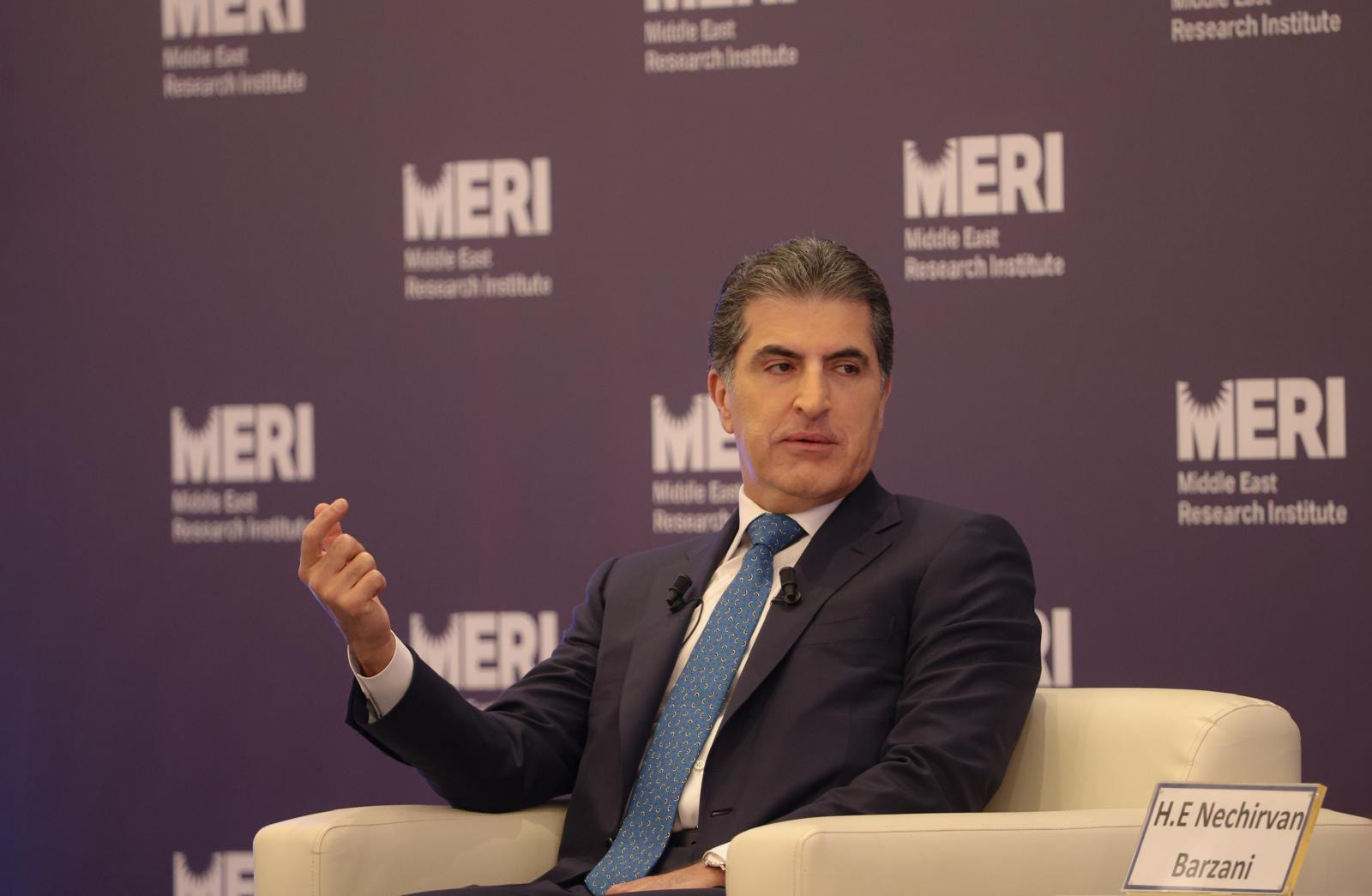
October 8, 2025
President Nechirvan Barzani took part in a panel discussion titled ''Shaping the Future and Visions for Peace and Prosperity'' during the annual forum of the Middle East Research Institute (MERI).
The discussions focused on the relations between Erbil and Baghdad, the upcoming Iraqi parliamentary elections, and the Kurdistan Region's connections both regionally and globally. Below is the transcript of the discussions:
Q: What is the Kurdish leadership's vision and strategy for Iraq and the region?
President Nechirvan Barzani: Thank you, and thank you to the audience. Prior to 2003, economically, we were not as prosperous as we are today, but the situation in the Kurdistan Region was similar to our current circumstances. The Americans informed us that a new Iraq was being established, founded on the principles of democracy and federalism. We, as Kurds, especially the Kurdish leadership, may God bless his soul Mam Jalal, and President Masoud Barzani, did not overlook what was essential for the new Iraq.
We envisioned an Iraq that would put an end to the suffering and devastation experienced by the Kurds. If the question pertains to our accomplishments over the past 20 years, I believe that the Iraqi Constitution itself stands as a significant achievement for the Kurdistan Region, and we must not underestimate its importance.
The provisions that acknowledge certain rights of the Kurds, as well as those of all communities—not solely the Kurds—should be regarded as a substantial achievement. However, the major issue remains whether this constitution has been effectively implemented. I can respond to that question with a definitive "no.”
All the issues currently observed in Kurdistan regarding oil, the budget, Article 140, and the Peshmerga can be traced back to a single source: the Iraqi constitution has not been fully implemented. The situation in Iraq is as follows: when asked, the Iraqi Shiites express a persistent fear of the past. The Sunnis, on the other hand, indicate that the future remains uncertain. The Kurds, however, respond: Neither the past, nor the present, nor the future is clear! They are apprehensive, questioning where this is all heading.
In my opinion, for Iraq to achieve political, social, and economic prosperity, the foremost requirement is adherence to the Iraqi constitution. A significant 80% of the Iraqi populace endorsed the constitution, which we also supported. I distinctly recall that upon the constitution's drafting, President Masoud Barzani returned from Baghdad, stating, “It does not encompass all of our rights, yet it also embodies significant accomplishments.”
The most pressing issue in Iraq is the ambiguity surrounding whether the Iraqi system is federal or centralized. In practice, it is exceedingly centralized. Although it is labeled as a federal Iraq, in reality, Iraq is anything but federal.
The actions being taken regarding the Kurdistan Region are unprecedented in any federal system. The approach of Iraq towards the Kurdistan Region exemplifies a pronounced centralism. During a meeting with the Coordination Framework, which is composed of Shiite factions, I said, ‘My brothers, I must be honest with you. Do not assume that the Kurdistan Region is more than a federal entity; and of course you see Iraq as a country with sovereignty. Let us convene and determine how we can align our efforts.’ The Kurdistan Region continues to assert (as I have stated numerous times and will reiterate) that it firmly believes that its strategic depths lies with Baghdad.
This is neither related to politics nor to negotiations. It is imperative that we reach an agreement with Baghdad. You brought up the elections. The year 2005 marked a time in Iraq when the democratic system was established in this nation. Democracy encompasses more than merely participating in elections every four years; it is a significant and ongoing process. Today, I received the former prime minister in a capacity akin to an ordinary citizen. This represents a substantial transformation in Iraq.
A democratic process exists in Iraq, and it is essential that we genuinely acknowledge it. However, the question remains: is this sufficient, or is it inadequate? That is a separate issue.
Democracy cannot be viewed as a package to be bestowed upon a nation. The major error committed in 2003 was the belief that democracy could be presented as a gift; in reality, democracy is a facet of daily existence. Is the democracy in Kurdistan flawless and devoid of any issues? No, it is not. Nevertheless, we believe we are progressing in the right direction, despite the various circumstances we face. Democracy is not a present to be given to a populace; it is a continuous practice that requires time for nations to attain this level.
I believe this election holds significant importance. It is the most crucial election in Iraq since 2005. This is not an election campaign; I wish to emphasize the significance of this election.
In Kurdistan, a common question is often raised: why should we participate in elections? We must demonstrate that the Kurdish influence and unity in Baghdad serve as a source of strength for the Kurdistan Region. The Kurdistan Region ought to devote as much attention to local elections as it does to Iraqi elections. The Constitution remains unimplemented. Since 2005, Iraq has experienced various stages, including civil war, the rise of ISIS, and other challenges. Although Iraq has been in a transitional phase for a lengthy period of 22 years, the process of state-building remains relatively new. It is essential to recognize that state-building cannot be accomplished in just a day or two, or even at this current moment. It requires time.
The upcoming Iraqi elections are ushering us into a new phase. What does this phase entail? It signifies the implementation stage of the Iraqi constitution. This is why this phase is vital for the Kurdistan Region. I believe that Baghdad, along with all its components, now comprehends the necessity of initiating this phase, as the implementation of this constitution is crucial for achieving political, social, and economic stability in Iraq.
Q: Why is the Kurdistan parliament not convening? Why has the government not been established? What are the reasons for the ongoing issues in Kurdistan?
President Nechirvan Barzani: That is indeed a very pertinent question. First, I would like to address the election that took place. We conducted a highly successful election in the Kurdistan Region, with a voter turnout of approximately 72%. During the elections, two significant rallies took place in Erbil: one organized by the KDP and the other by the PUK. These two prominent parties conducted their election campaigns within the same city without any conflicts arising between them, which is a significant achievement for the way our people think.
The government formation process has been protracted; however, what is important is that our relationship with our allies in the PUK has significantly improved compared to the past.
We have developed a collaborative document outlining our political vision for the future governance of this country and our relationship with Baghdad. What remains to be determined is the allocation of positions. I do not wish to offer excuses for the delays, but it has indeed taken a considerable amount of time, and I do not intend to justify it.
I believe we should have established the government sooner; however, we must acknowledge certain realities. I had anticipated that the government would be formed two or three months after the elections, yet there are various obstacles and a lack of trust.
Regarding Mr. Bafel's statement, the PUK is the primary partner in this government, not an observer. Consequently, the PUK cannot evade its responsibilities. The PUK is also an active participant in this government. Both the PUK and the KDP, along with others involved in this government, bear responsibilities. I believe the KDP perceives the PUK as its principal partner.
Q: My understanding is that the Kurdish strategy for the upcoming phase in Iraq is centred around the necessity of implementing the Iraqi constitution.
President Nechirvan Barzani: We possess no legal documents other than the constitution. Our focus in the Kurdistan Region is on implementing the constitution. We acknowledge the transitional period that began in 2005. Iraq has been navigating through a transitional phase thus far. Our responsibility is to determine when the salaries will be disbursed from Baghdad. This should not pose an issue between the Kurdistan Regional Government and Baghdad. If the citizens of the Kurdistan Region are recognized as part of the Iraqi people and Iraqi salaried workers, this matter should not create a conflict between us. Indeed, we assert that following this stage, after the elections, the Kurdistan Region, representing all its communities, will advocate for the implementation of the constitution. There is a desire for the current constitution to be enforced. It is understood that, according to the constitution, we have both rights and responsibilities. We acknowledge both aspects. I believe that this is our objective at this stage.
Q: Is it likely that we will witness the establishment of a government in the Kurdistan Region prior to the Iraqi elections?
President Nechirvan Barzani: I do not think so.
Q: Are we witnessing changes due to the upcoming elections?
President Nechirvan Barzani: The electoral and democratic process in Iraq is currently undergoing a transitional phase. However, if we assess the situation in Iraq realistically, we must ask ourselves: Is the present condition in Iraq comparable to what it was six years ago? Upon examination, it is evident that there have been improvements in every aspect. For instance, in Baghdad, there are presently no security issues. Six years prior, discussing this topic was quite challenging. The primary concern in Baghdad today is traffic congestion. Therefore, while the progress may appear to be rapid and somewhat erratic, we must acknowledge the achievements that have been made and those that are yet to come. Citizens have the right to demand more, and it is entirely reasonable for the youth to seek change. This is a normal expectation; however, I believe that the Iraqi process, which has been notably intricate, is showing signs of improvement compared to a few years ago. The current Iraqi Prime Minister has stressed the necessity of providing services, and we can now observe that the quality of services across Iraq is significantly better than it was a few years ago.
From a political standpoint, I do not anticipate significant changes; however, the pressing question remains: if elections are not conducted, what will take their place? Iraq will not revert to a dictatorship or singular rule. That era has concluded in Iraq. The current mechanism for change in Iraq is through elections. Elections also empower every individual to engage in the changes they wish to see. In my point of view, the electoral process in Iraq is crucial for the country's democracy and the ongoing stability of that democracy. This is something we must reiterate in Iraq, both now and in the past.
I believe the primary issue is the lack of consistent institutions. Iraq lacks a functioning institution. In the absence of such institutions, what exists is a deficient media landscape. For instance, the media disseminates a sense of hopelessness, leading people to despair about the future, and Iraq generally lacks the institutions capable of addressing these issues. I contend that the primary focus in Iraq should be on establishing robust institutions rather than privatizing them. Currently, the emphasis is placed on the prestige and image of certain individuals, as well as their charisma. This trend must come to an end. As Iraq progresses towards democracy in Baghdad, Erbil, and throughout the nation, it is imperative that state institutions are strengthened. Without strong state institutions, the hopelessness you have mentioned will persist. The Iraqi situation is inherently complex, and it is essential to continually compare it to the past.
Q: Who will represent the new generation of leadership in Iraq?
President Nechirvan Barzani: It is unnecessary to specify names. One individual or another may emerge, but we should focus on the overarching trend. You referenced October and similar instances (the Tishreen Movement), yet their slogans lacked realism. In essence, the calls for change in Iraq were not grounded in reality, leading to their failure. They proclaimed, 'We will dismantle it!' But what exactly are they dismantling? Such a collapse will lead to complications, as each political faction will rally its supporters to avert the downfall. However, if the conversation is genuinely aimed at improving Iraq, that is a positive development. I believe they have mishandled their relations with other political forces from the beginning.
In this context, the real danger for Iraq does not stem from the emerging new generation that is gradually stepping into the political arena. The true threat to Iraq lies with the factions that possess weapons outside the legal framework. These groups pose a significant risk to Iraq and its future. Neither the events of October nor any other movement constitutes a threat. It is these armed factions that represent a threat and could lead to a substantial disaster for Iraq's future.
Q: How can we facilitate the involvement of young individuals in the economic and political spheres of the nation?
President Nechirvan Barzani: These reforms are essential for any individual who assumes the role of prime minister, irrespective of their prospects for re-election. They must undertake some very challenging decisions. Iraq is indeed a unique nation; for instance, it requires approximately six billion dollars merely to cover monthly salaries. Where else in the world does this occur? The forthcoming Iraqi government must earnestly endeavor to reform governmental institutions. The engine of progress in any country is its private sector. Back in 2002 or 2003, our private sector was relatively weak, but it has since significantly improved. Is the Kurdistan Regional Government currently contemplating the enactment of legislation regarding retirement for those employed in the private sector? This indicates that we have reached a pivotal moment in our discussions.
The youth demographic in Iraq represents a substantial force, growing by one million individuals annually. This underscores the significance of the upcoming election. This election holds great importance because, if you had inquired of the people 10 or 15 years ago about their primary concern, they would have responded, "Security!" That concern has now faded. The current focus has shifted to job opportunities. The question now is, how can we engage young people in this process? Iraq has moved beyond that initial stage.
The current situation in Iraq, following the elections, indicates that a new era of significant reform is essential. A nation cannot sustain a monthly expenditure of $6 billion solely on salaries; such a scenario is unprecedented globally. Eventually, this country will face substantial challenges.
Consider this: if oil prices were to drop below $50 tomorrow for any reason, what consequences would arise for this nation? A severe crisis would ensue! Consequently, regardless of who assumes the role of prime minister and the government that is subsequently established, the foremost priority must be to implement extensive reforms within the institutions. Currently, discussions surrounding electricity in Iraq reveal that it is heavily subsidized, as are the oil and gas sectors, among others.
This approach is not sustainable for governance. There must be a strategic shift towards fostering the private sector and enabling it to participate in legislative processes. It is crucial to enhance the Iraqi banking system. Presently, when Iraqis reach out to potential investors, they are met with skepticism; the lack of trust deters investment. What is required is a situation where foreign investors can feel assured about the country's legal framework.
The existing Iraqi investment law fails to incentivize individuals to invest in this nation. Furthermore, if legal issues arise, can one trust the Iraqi judiciary? I am addressing this matter comprehensively, including our own judiciary. Is the Iraqi judiciary sufficiently reliable for individuals to seek redress? Is the Iraqi banking system adequately organized? Iraq is not merely a singular entity; investors have the option to invest elsewhere.
Q: All the points you made are valid, but corruption is one of the issues that US and European investors in the Kurdistan Region and Iraq regard as a significant concern. What do you perceive as the remedy for corruption?
President Nechirvan Barzani: I cannot assert that corruption does not exist. I cannot claim that there is no corruption whatsoever, but it is not an issue that can be resolved instantly.
Q: Is there an initiative underway?
President Nechirvan Barzani: There are efforts to amend the legislation. There are initiatives aimed at enhancing transparency. Indeed, we observe considerable efforts in the Kurdistan Region regarding this matter. There are numerous initiatives in Iraq as well, but can these issues be resolved immediately? In my view: No! This is a cultural challenge, intertwined with various social factors, and it must be tackled independently through a systematic process.
Q: We are entering a phase in both the region and globally where drones and drone strikes are transforming diplomacy, security, and the economy. How is the Kurdistan Region addressing this challenge?
President Nechirvan Barzani: The drones in Europe are at the very least not equipped with explosives. Those who launch attacks on the Kurdistan Region are equipped with bombs and missiles.
Consider this; it leads us to another subject. They have targeted the Kurdistan Region using drones. They have struck oil companies. An attempt was made at Erbil airport. My sole question is: What does Iraq stand to gain from this? What is Iraq's interest? We are discussing the most significant threat to Iraq, which comes from forces operating outside the law, and our demand is that they must be brought under legal authority and placed under the command of the prime minister, who serves as the commander-in-chief of the armed forces. This is our demand as the Kurdistan Region.
What occurred in the Kurdistan Region, in my view, was a setback for all of Iraq, and there has been considerable negligence on Baghdad's part in responding to these forces. Baghdad is well aware, perhaps better than we are, of who is responsible. However, they should have adopted a serious stance on this matter, as it poses not only a threat to the Kurdistan Region but also constitutes a violation of the dignity of all Iraqi institutions. This action undermines the entire Iraqi regime, which claims to be a sovereign nation. It is an affront to Iraqi sovereignty.
Let me express it this way. When we visit Baghdad, we receive an hour-long lesson on Iraqi sovereignty and related topics; however, it is quite common for an armed force to launch an attack on a region that is part of Iraq. The issue surrounding drones has escalated into a significant concern, but the real problem in Iraq is not the use of drones by individuals but rather their deployment by an armed force that is funded by the Iraqi government. This is where the danger lies. These forces are compensated by the very institutions of the Iraqi government, and they are the same entities that utilize drones against the Kurdistan Region. This must come to an end. If it does not, the Kurdistan Region will react.
Q: What solves this?
President Nechirvan Barzani: The stance is that they must operate within the framework of the law, under legal authority, and under the command of the prime minister, who serves as the commander-in-chief of the armed forces. They must adhere to this. Otherwise, as I have stated, the Kurdistan Region will not remain passive and will react.
Q: If I consider the regional context, we previously discussed the year 2005, when the United States and the region were aligned. Now, we are revisiting the concept of a new Middle East. In this new Middle East, perhaps the most prominent voice is Israel following the Gaza conflict; however, Iran, Türkiye, Saudi Arabia, the UAE, and Qatar each possess their own perspectives regarding this new Middle East. In the meantime, the Kurdistan Region has established various relationships and has upheld its stance. Beginning with Iran, as I mentioned earlier, the ties between Iran and the Kurdistan Region in 2005 appeared to be stronger than those between the Kurdistan Region and Turkey. What is the current state of the Kurdistan Region's relationship with Iran, and what measures are being taken to mitigate such threats?
President Nechirvan Barzani: There are two key aspects regarding Iran. Firstly, Iran is a significant neighbor to us. We share a lengthy border with Iran, and we have consistently aimed to maintain positive relations with them. Concurrently, we pose no threat to Iran. We do not wish for any opposition to arise from our neighbors, particularly from the territory of the Kurdistan Region, in any form. Iran is one of the nations we strive not to threaten. This principle is central to the Kurdistan Region's policy. Our objective is to contribute to security in the region, rather than fostering destruction. This remains the guiding policy of the Kurdistan Region. In this regard, you referenced our ties with Iran; economically, our trade with Iran amounts to approximately $11 billion. I believe it was last year when I visited Iran, and following that visit, a new chapter in the relations between Iran and the Kurdistan Region was initiated. The Iranian president visited Erbil, which I consider to be a very positive development in our relations with Iran. Once again, Iran is a crucial country. We aspire to further enhance our existing relationship, and the Kurdistan Region will not pose a threat to the Islamic Republic of Iran. Iran has provided assistance to the Kurdistan Region during these challenging times, for which we express our gratitude. It is an important neighbor, and we are keen to cultivate good relations with it. I believe that after my visits to Iran and my meeting with Ayatollah Khamenei, the Supreme Leader of the Islamic Republic of Iran, the nature and quality of our relations have improved significantly.
Q: The region is currently facing an emergency situation. A nation such as Qatar previously maintained positive relations with Iran. However, this year, Iran launched an attack on Qatari territory, not directly against Qatar, but within its borders. Additionally, Qatar serves as a mediator between Israel and Hamas, having invested over $2 trillion in the United States. Qatar had hoped that these investments would provide a safeguard, yet we find ourselves in a world where, despite such financial commitments, the threat remains unresolved. I wish success in fostering those relationships. Regarding Türkiye, a peace process is currently underway between Türkiye and the PKK. We had speakers addressing this issue today, and it was a topic of discussion on various panels yesterday. They view the process with optimism, asserting that, regardless of its slow pace, it deserves an opportunity. Conversely, some express skepticism, arguing that it has stagnated, become entrenched, and is likely to fail like previous attempts. What is your evaluation of this process? What role do you foresee for the Kurdistan Region in this context?
President Nechirvan Barzani: When discussing our relations, it is evident that we share a very amicable relationship with Türkiye. Our connection is distinct, both in economic and political terms. The Kurdistan Region is committed to preserving this relationship with Türkiye. Regarding the ongoing process in Türkiye, regardless of its designation, I believe that after my meeting with the Turkish president, it is clear that Türkiye is genuinely serious about this initiative. Although the process may be gradual and at times seem sluggish, there is a strong resolve in Türkiye to see it through. However, our pause should not be excessively brief. There are certain actions that the other party must undertake, even if they carry risks. It is unrealistic to expect a resolution to a longstanding issue to occur overnight. At times, one must embrace certain risks. My message to our compatriots is to proceed, as it is preferable, even if the process is challenging. Currently, it appears that one side is anticipating action from the other, and vice versa. This issue will not be resolved in such a manner. The PKK must undertake specific measures for the process to reach its conclusion. I prefer not to delve into specifics, but it is incorrect to adopt a stance of waiting to see Türkiye’s actions before responding. Such a perspective is fundamentally flawed and unproductive. Our role is to assist; we have communicated this in Ankara and have engaged with the public regarding the contributions we can make. When the disarmament process commenced, they requested our assistance, and we fulfilled our obligations accordingly. I believe this represents a historic opportunity that the Kurds must seize without hesitation. President Ocalan's messages are exceedingly clear. Qandil is fully aware of the necessary actions yet fails to take them. This leads to disappointment, even for President Ocalan, which is unjust. They claim they will follow President Ocalan's directives, but when it comes to execution and practice, they do the complete opposite. This will inflict significant harm on the Kurds and the ongoing process. There is no time for such games. My assertion is that our brothers need to approach this process with seriousness and make a concerted effort to ensure that it does not falter, ultimately leading to a resolution.
Q: The leadership in Iraq generally views Syria with apprehension, fearing the rise of extremism. In contrast, the international community and regional players view it as an opportunity to intervene and assist in preventing Syria's collapse. I have a two-part question for you. Firstly, from your perspective and that of the Kurdistan Region, do you regard this situation as an opportunity, or do you approach it with trepidation? Secondly, regarding the western part of Kurdistan, an agreement exists between the Syrian Democratic Forces and the government in Damascus, which both parties claim is not being implemented. There is a potential threat that Türkiye may initiate a military operation in the area. What is your evaluation of this situation? What measures can be taken to foster a constructive relationship between the Rojava and Damascus?
President Nechirvan Barzani: In truth, the current situation in Syria represents, in my opinion, the final opportunity for the country. Therefore, I believe it is our responsibility as the international community to assist this force in steering Syria towards a different path. We do not perceive it as a threat. We assert that the Syrian people, across all their communities, are entitled to a better quality of life. They have endured significant hardship. That nation, encompassing all its communities, merits an improved existence. A crucial aspect, which we consider a point of disagreement with Damascus, is our conviction that Syria cannot be governed from a central authority. This is a matter of dispute, and I even brought it up during my discussion with President Ahmed Al-Sharaa.
Syria is not merely a single community; it is a collection of diverse communities, including Kurds, Druze, Alawites, and Christians, all of whom are part of the Syrian identity. Therefore, if one asserts that Syria will be governed centrally, even with the departure of Bashar al-Assad and the arrival of a new leader, the centralist approach will persist. We in the Kurdistan Region do not endorse this perspective. We have communicated this to President Al-Sharaa; however, it is essential for them to be given an opportunity to determine the direction in which they are steering Syria. Strong centralism is not a viable governance model for Syria. Regarding the grievances expressed by both sides, I believe both parties have valid points. Our message to our Syrian brothers has been to go to Damascus as soon as possible. They should raise the new flag of a reformed Syria, recognize themselves as stakeholders in the political process, establish an office in Damascus, and actively engage in the Syrian political landscape. In 2002 and 2003, the Kurdish influence in Baghdad was significant. On several occasions, we deployed Peshmerga forces to act as a buffer between Sunnis and Shiites to prevent conflict. Our message to our Syrian brothers remains clear: go to Damascus, as it is your capital and your country; do not wait for anything to be handed to you. I am uncertain about what they are currently anticipating. What transformations are they hoping for? What do they believe will change? Regardless of the nature of the change, it is in their best interest to seek a resolution with Damascus. Who takes the initiative first, and what roles do they assume? For instance, I believe they were instructed to integrate with the Syrian army. This perspective is incorrect; it is a flawed viewpoint. Alternatives can be explored. I recall that during 2002-2003, our primary issue with the Americans was their request for us to alter the name of the Peshmerga. They inquired about the appropriate course of action regarding this matter. They proposed the name Mountain Rangers. After three days of deliberation, they asked what it would be if we translated that title into Kurdish. Mr. Masrour asserted that it would mean Peshmerga. They addressed Mr. Masrour, stating, "Your English is great.” He responded that if you translate it (Mountain Rangers) into Kurdish, it will remain Peshmerga, he affirmed. In Syria, this faction has endured significant losses in the battle against ISIS and has faced immense tragedy. There are 10,000 ISIS combatants incarcerated in prisons in Al-Hawl. Syria requires governance that is decentralized. Every individual in Syria must regard themselves as stakeholders in the country; otherwise, effective governance is unattainable.
Q: The connection between the Kurdistan Region and Rojava (Syrian Kurdistan) fluctuates between periods of warmth and coldness. What is the underlying issue?
President Nechirvan Barzani: At times, the relationship may be cold, while at other times it may be warm, yet the fundamental situation remains unchanged. Similar to the dynamics between the PUK and KDP, there are moments of both warmth and coldness. Occasionally, people express concern about harmful outcomes, but ultimately, nothing harmful will occur. I assure you, nothing harmful will transpire. There was a period when predictions of war were prevalent. However, we have moved beyond that phase. We will not engage in conflict with one another again. Thankfully, that era has departed from Kurdish culture. But does this not present a problem? Indeed, there are issues, and at times, numerous challenges arise, yet our overall contribution has been constructive. What do we seek from Rojava? We assert that you may conduct your affairs independently. The PKK must not interfere in your daily operations. This represents their greatest challenge. The PKK needs to relinquish its influence over them. If the PKK fails to do so, it will achieve nothing. The PKK must completely withdraw and refrain from interfering in the management of Rojava matters.
Q: The Trump administration has created both opportunities for certain nations and challenges for others. What are the challenges and opportunities present in the Kurdistan Region's relationship with the United States?
President Nechirvan Barzani: To answer your question directly, I believe there are greater opportunities for the Kurdistan Region and for Iraq. We share this perspective. We endorse President Trump's approach to achieving peace in the Middle East and support his efforts to establish peace in Gaza as soon as possible. As Kurds, alongside the United States and Iraq, we maintain a strong relationship with the United States, which is not a recent development but rather a longstanding one. The United States has provided significant assistance to the Kurdistan Region during challenging times, for which we are grateful. In fact, we could not have halted ISIS without the support of the international community, particularly the United States. This is an undeniable fact; we could not have done it alone. It was through the sacrifices of the Peshmerga, combined with their assistance, that we managed to stop ISIS. We express our gratitude to them, as their involvement has been beneficial to the Kurdistan Region. We view this administration, under President Trump, as a source of opportunity rather than a challenge.
Q: Let us return to internal affairs. What is the final message from President Nechirvan Barzani to the people of Kurdistan and the leaders of both Kurdish and Iraqi political parties?
President Nechirvan Barzani: Frankly, as I stated in my introductory comments, this election is the most significant one in Iraq since 2005, and I emphasized its importance for the Kurdistan Region as part of Iraq. The strategic relationship of the Kurdistan Region is with Baghdad. Despite the numerous issues we face with Baghdad and the grievances we have against each other, it is crucial to uphold that strategic connection with Baghdad. Concerning the future of Iraq, this election holds great significance, and it is equally vital for the future of the Kurdistan Region. My request is that every Kurdish citizen recognize their responsibility and refrain from questioning why they should participate in the elections. We must all unite and contribute to ensuring the success of this electoral process in Kurdistan. What is paramount for us is consensus. Let us explore a method to collaborate, even if we do not label it as consensus; we should seek a framework for how the Kurdish forces can cooperate. Together with the opposition, the government, and all of us, we can achieve remarkable outcomes in Baghdad. I sincerely hope that the elections proceed smoothly, God willing. I aspire for Iraq to embark on a new chapter and a fresh start, focusing on reconstruction, institutional development, and addressing the unresolved issues with the Kurdistan Region.
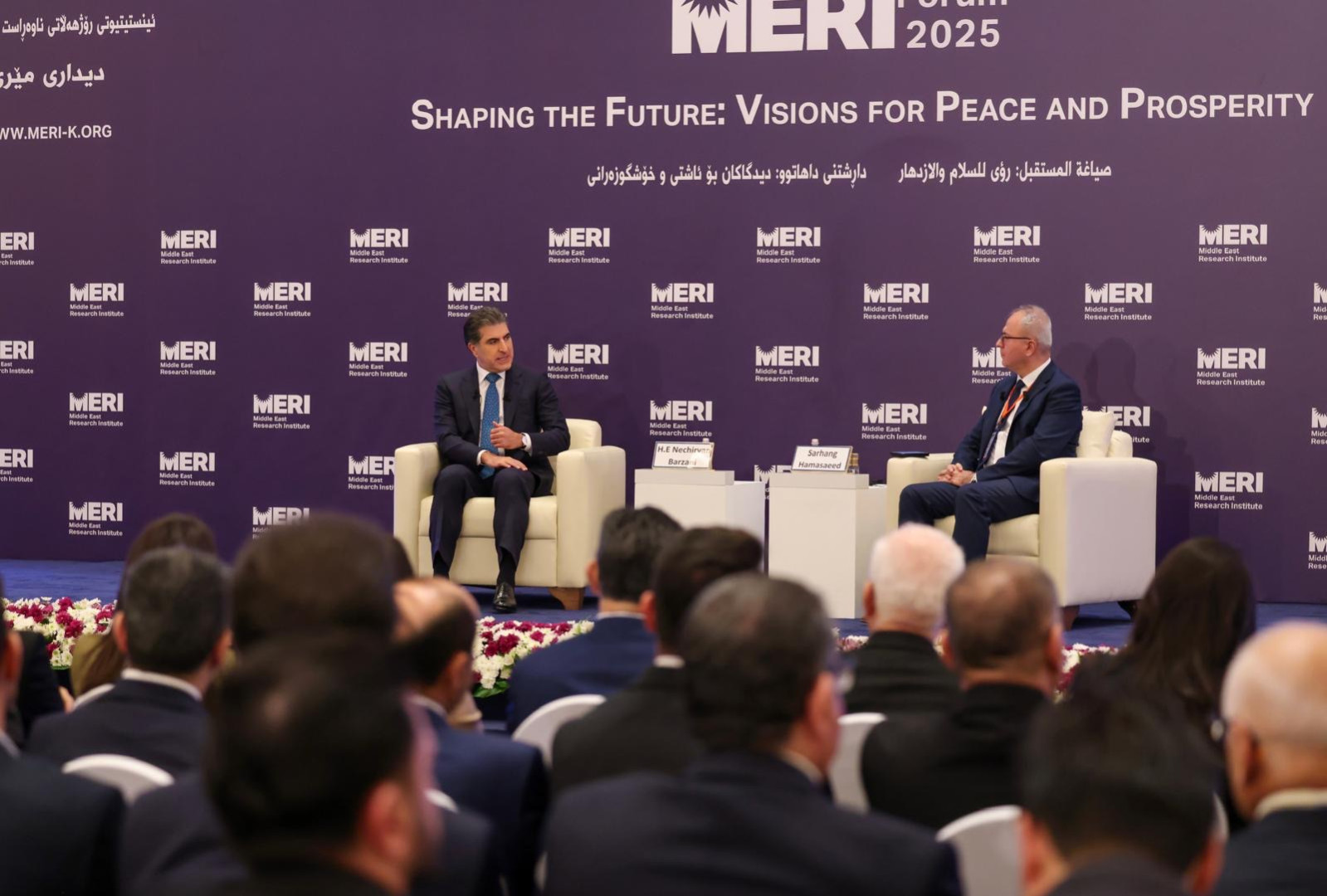
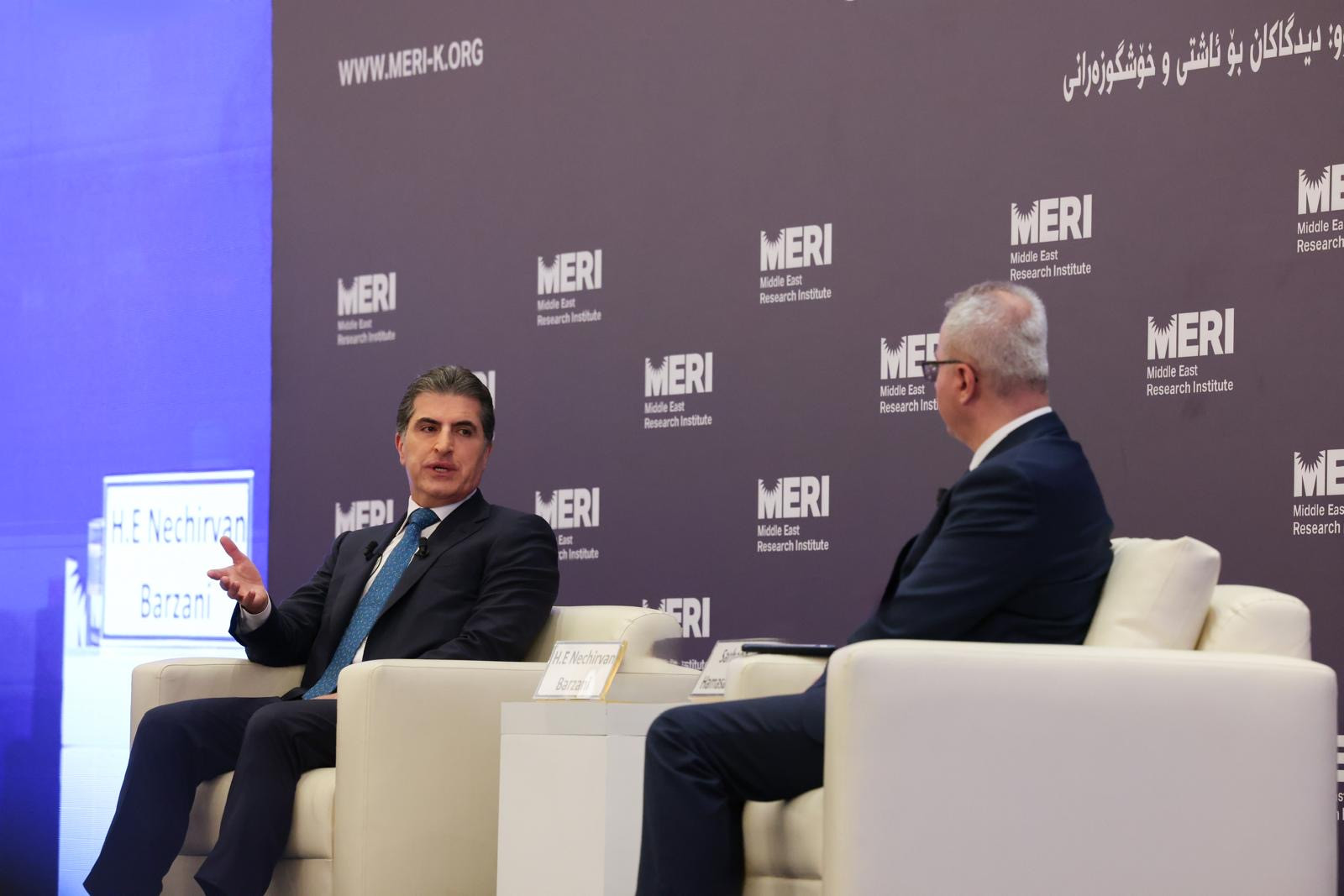
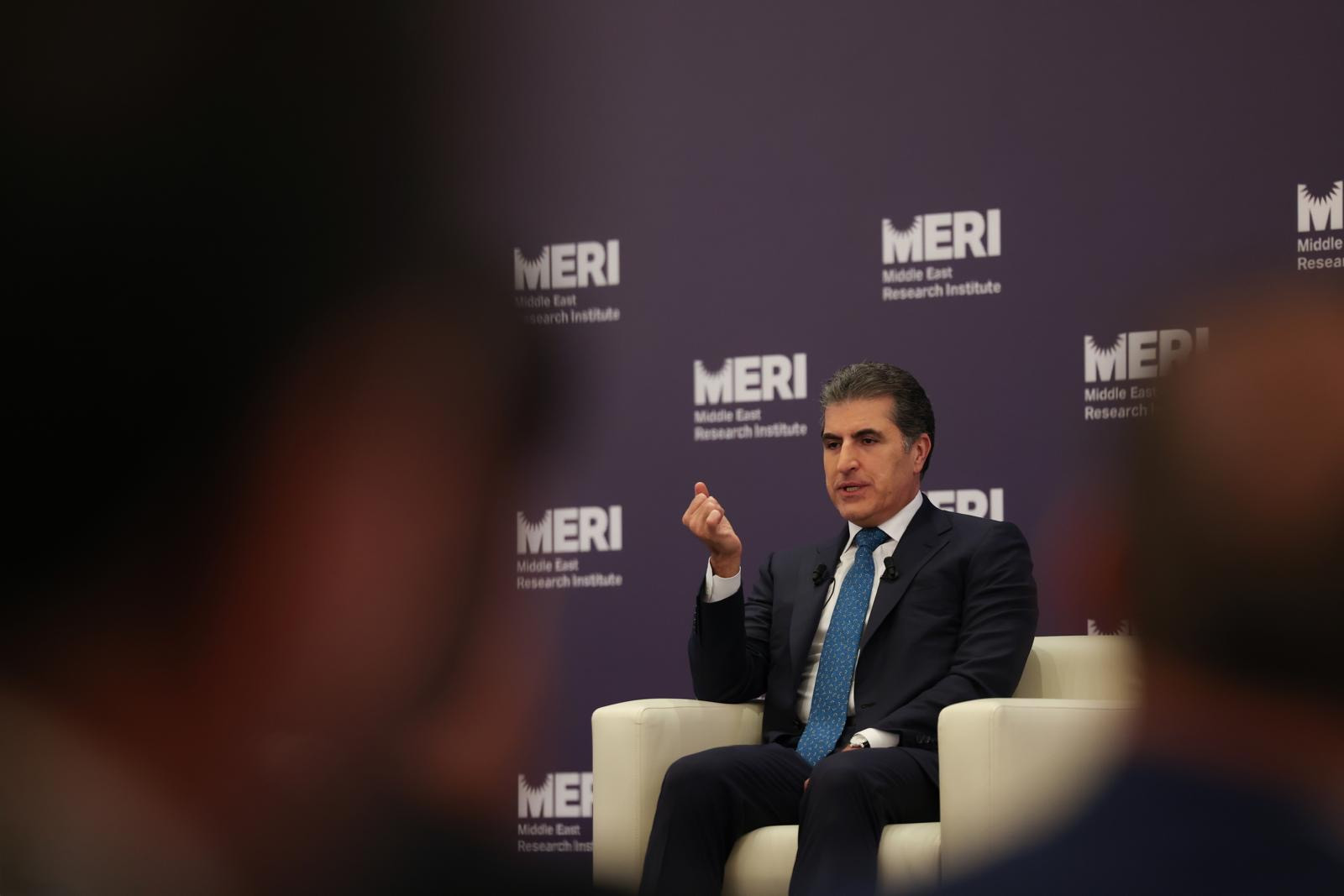
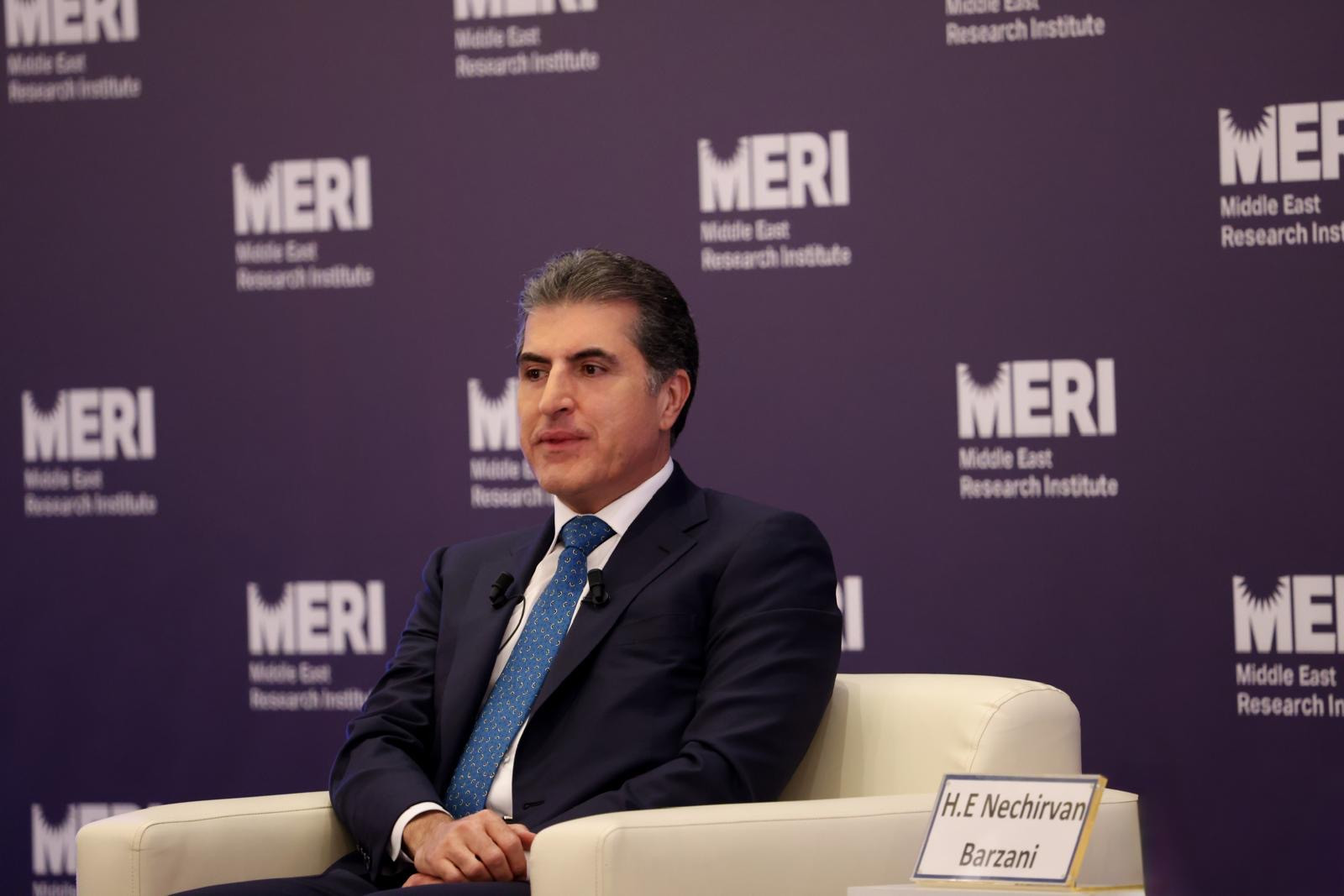
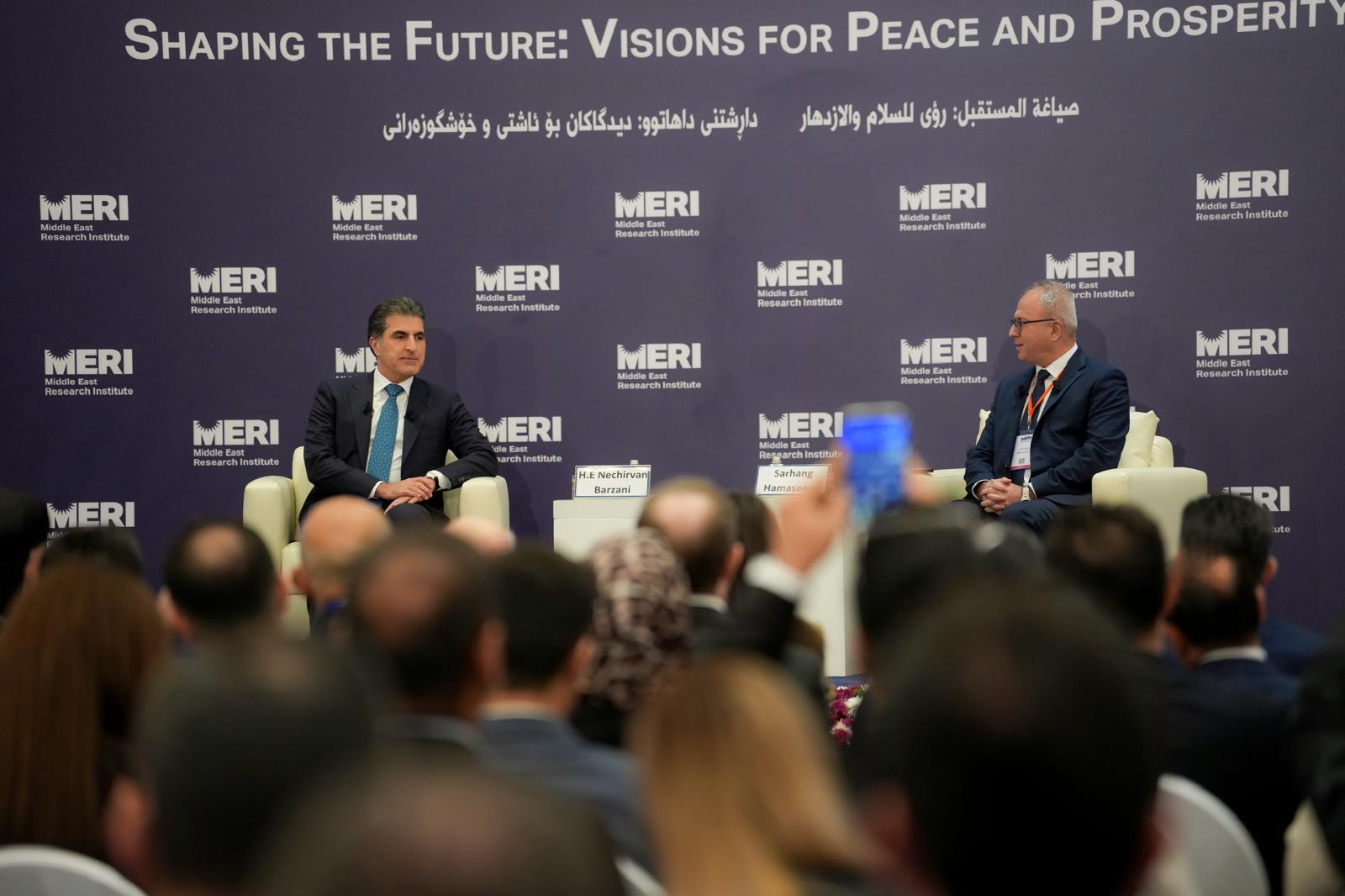
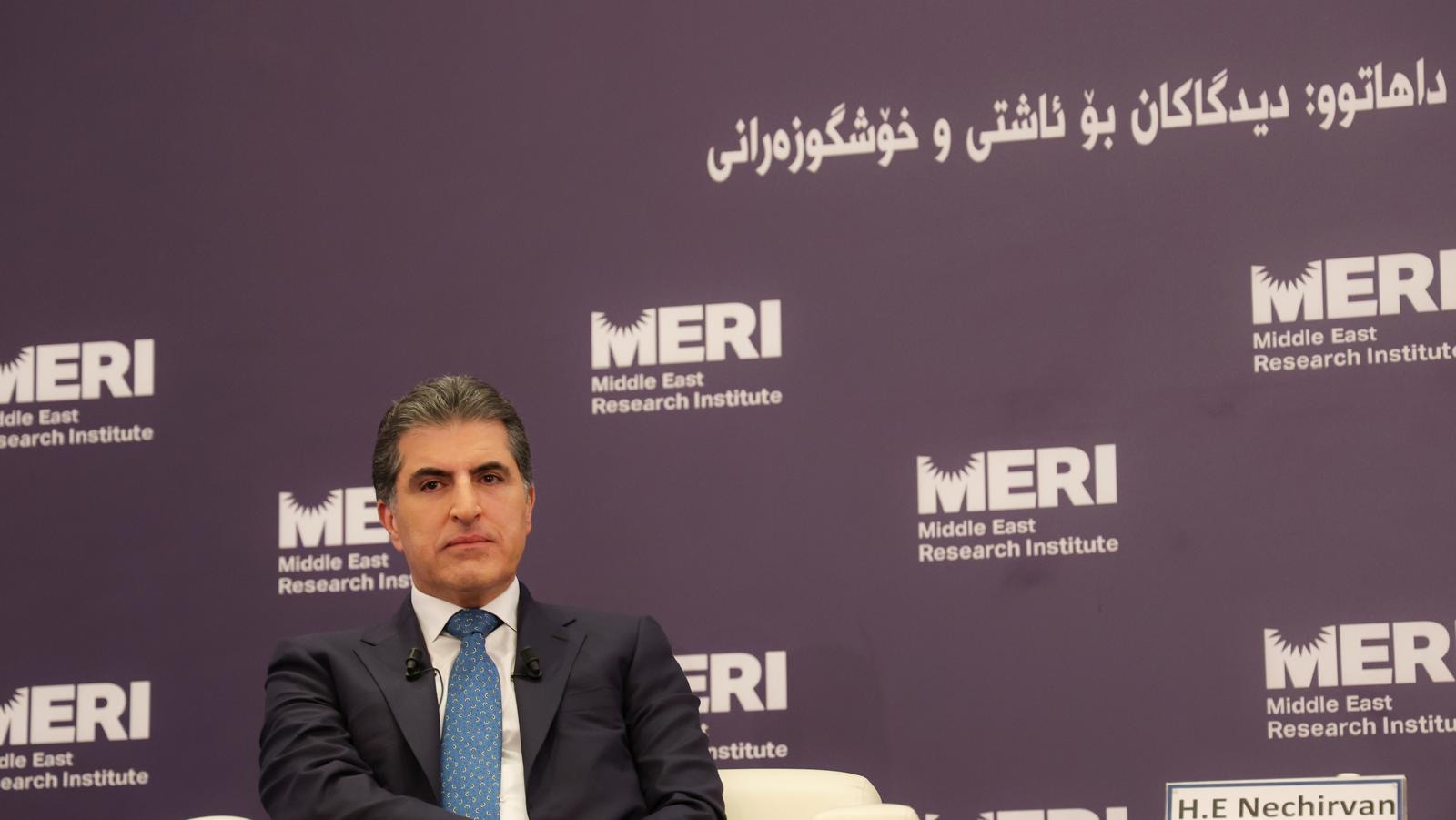
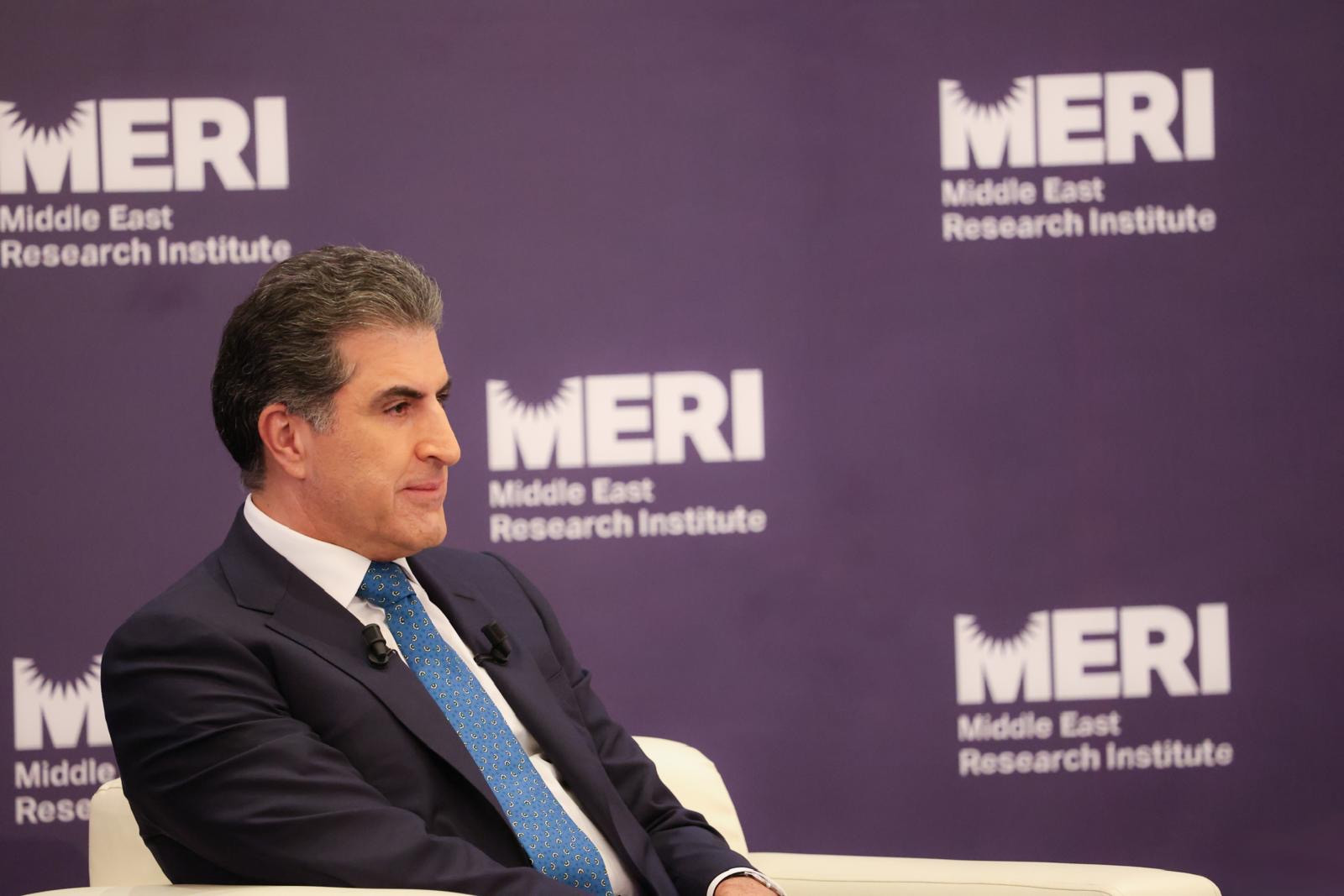





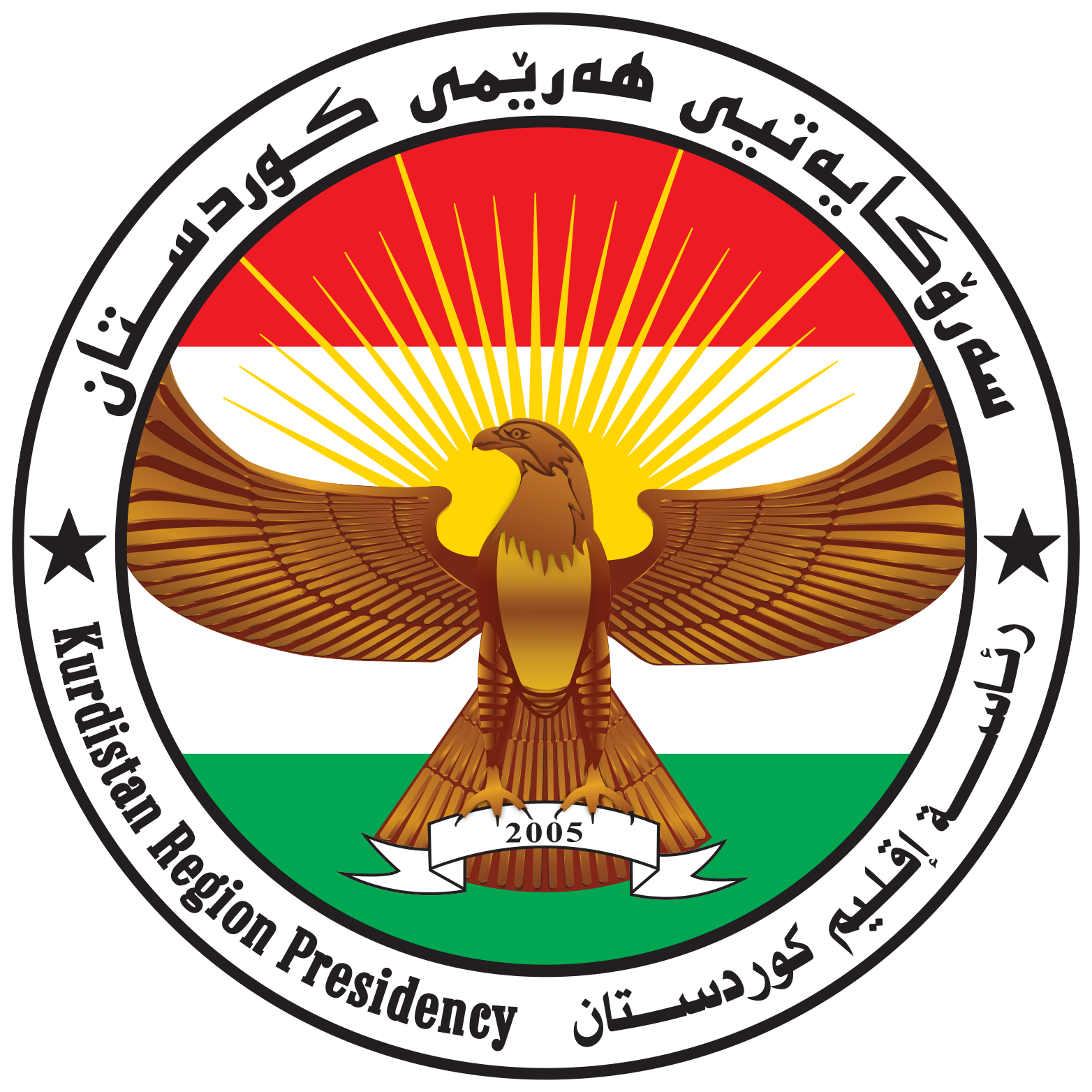

 پەرلەمانی کوردستان
پەرلەمانی کوردستان
